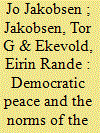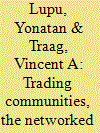| Srl | Item |
| 1 |
ID:
148793


|
|
|
|
|
| Summary/Abstract |
The democratic peace literature has convincingly shown that democracies do not fight other democracies. Theoretical explanations of this empirical phenomenon often claim that the citizenry in democracies prefers peaceful resolution of interstate conflicts. Still, there is a dearth of studies exploring the public’s preferences and values directly. We seek to rectify this by investigating, in a novel way, the relationship between regime type and citizens’ bellicosity. A comprehensive multilevel research design is employed, with data spanning 72 countries over the period of 1981–2008. This enables us to test one of the theoretical mainstays of the democratic peace thesis, viz., that regime type helps shape individuals’ attitudes toward war-fighting. Our results lend special support to normative democratic peace theory: Citizens of democracies are significantly more pacifistic than citizens of non-democracies. This result upholds when we rigorously control for other relevant factors, including specific characteristics of individuals and rival theoretical explanations.
|
|
|
|
|
|
|
|
|
|
|
|
|
|
|
|
| 2 |
ID:
125121


|
|
|
|
|
| Publication |
2013.
|
| Summary/Abstract |
The authors argue that theories regarding the relationship between trade and conflict could benefit greatly from accounting for the networked structure of international trade. Indirect trade relations reduce the probability of conflict by creating (1) opportunity costs of conflict beyond those reflected by direct trade ties and (2) negative externalities for the potential combatants' trading partners, giving them an incentive to prevent the conflict. Trade flows create groups of states with relatively dense trade ties, which we call trading communities. Within these groups, the interruptions to trade caused by conflict create relatively large costs. As a result, joint members of trading communities are less likely to go to war; however little they directly trade with each other. The authors systematically measure and define trading communities across various levels of aggregation using the network analytic tool of modularity maximization. The authors find significant support for their hypothesis, indicating that interdependence theory can be extended to extra-dyadic relations.
|
|
|
|
|
|
|
|
|
|
|
|
|
|
|
|